Filter by
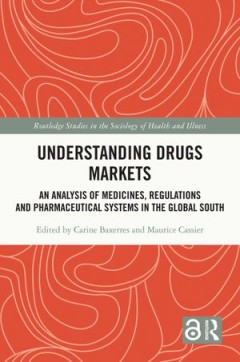
Understanding Drugs Markets : An Analysis of Medicines, Regulations and Pharm…
Drawing on anthropology, historical sociology and social-epidemiology, this multidisciplinary book investigates how pharmaceuticals are produced, distributed, prescribed, (and) consumed, and regulated in order to construct a comprehensive understanding of the issues that drive (medicine) pharmaceutical markets in the Global South today. Based on primary research conducted in Benin and Ghana,…
- Edition
- -
- ISBN/ISSN
- 9781000413106
- Collation
- -
- Series Title
- -
- Call Number
- 650
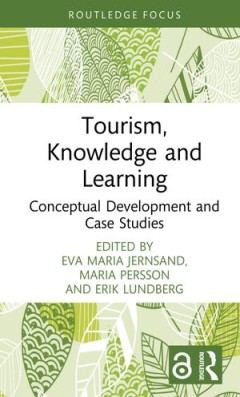
Tourism, Knowledge and Learning
This book contributes to the understanding of how tourism can be designed to provide conditions for learning. This involves learning for tourists, the tourist industry, public authorities and local communities. We explore how tourism, knowledge and learning can be used as means towards sustainable development through current, new or changed structures, concepts, activities and communication eff…
- Edition
- -
- ISBN/ISSN
- 9781000781267
- Collation
- -
- Series Title
- -
- Call Number
- 650

Business Law and the Legal Environment
Our goal is to provide students with a textbook that is up to date and comprehensive in its coverage of legal and regulatory issues—and organized to permit instructors to tailor the materials to their particular approach. This book engages students by relating law to everyday events with which they are already familiar (or with which they are familiarizing themselves in other business courses…
- Edition
- -
- ISBN/ISSN
- -
- Collation
- -
- Series Title
- -
- Call Number
- 650

Business Ethics
Business Ethics is designed to meet the scope and sequence requirements of the single-semester business ethics course. This title includes innovative features designed to enhance student learning, including case studies, application scenarios, and links to video interviews with executives, all of which help instill in students a sense of ethical awareness and responsibility.
- Edition
- -
- ISBN/ISSN
- 9781947172579
- Collation
- -
- Series Title
- -
- Call Number
- 650

Beyond Lean : Simulation in Practice
This book discusses how, in a practical way, to overcome the limitations of the lean approach to transforming manufacturing systems as well as related in-plant, plant-to-plant, and plant-to-customer logistics. The primary tools in this regard are algebra based mathematical models and computer-based systems simulation as well as the integration of these two. Concepts, methods and application stu…
- Edition
- -
- ISBN/ISSN
- -
- Collation
- -
- Series Title
- -
- Call Number
- 650
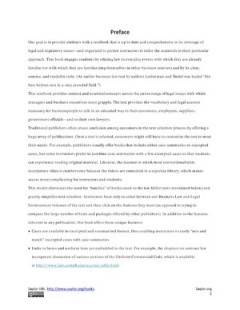
Advanced Business Law and the Legal Environment
Mayer, Warner, Siedel and Lieberman's Advanced Business Law and the Legal Environment is an up-to-date textbook with coverage of legal and regulatory issues that are more technical than the topics in the authors’ Foundations of Business Law and the Legal Environment.Appropriate for students who have already taken an introductory Legal Environment or Business Law course, the text is organized …
- Edition
- -
- ISBN/ISSN
- -
- Collation
- -
- Series Title
- -
- Call Number
- 650
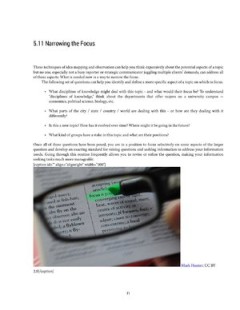
Information Strategies for Communicators
Written by two nationally recognized experts in information strategy, Information Strategies for Communicators leads students step-by-step through the information search and evaluation process for news and strategic communication message production. The book includes a conceptual model of the information strategy process, case studies to illustrate the process in action and links to current exa…
- Edition
- -
- ISBN/ISSN
- -
- Collation
- -
- Series Title
- -
- Call Number
- 650
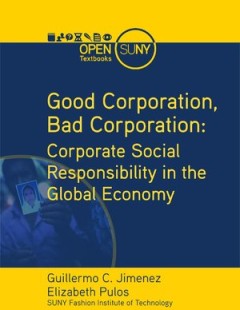
Good Corporation, Bad Corporation : Corporate Social Responsibility in the Gl…
This textbook provides an innovative, internationally oriented approach to the teaching of corporate social responsibility (C.S.R.) and business ethics. Drawing on case studies involving companies and countries around the world, the textbook explores the social, ethical, and business dynamics underlying C.S.R. in such areas as global warming, genetically modified organisms (G.M.O.) in food prod…
- Edition
- -
- ISBN/ISSN
- -
- Collation
- -
- Series Title
- -
- Call Number
- 650
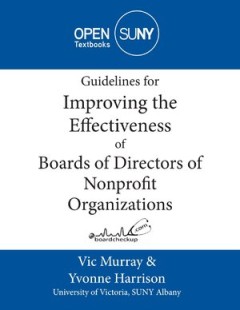
Guidelines for Improving the Effectiveness of Boards of Directors of Nonprofi…
The purpose of this book is to help boards of directors of nonprofit organizations improve their performance after completing the online board self-assessment tool found at www.boardcheckup.com. However, it can also be used as a stand-alone resource for any board seeking to enhance its effectiveness in that it also contains the diagnostic questions on which the online tool is based. The approac…
- Edition
- -
- ISBN/ISSN
- -
- Collation
- -
- Series Title
- -
- Call Number
- 650

The Legal and Ethical Environment of Business
Terence Lau and Lisa Johnson’s The Legal and Ethical Environment of Business is a book for today’s student, who expects learning to be comprised not only of substance, but also of interactive exercises and multimedia. This book streamlines the presentation of material to ensure that every page is relevant, engaging and interesting to undergraduate business students, without losing the depth…
- Edition
- -
- ISBN/ISSN
- -
- Collation
- -
- Series Title
- -
- Call Number
- 650
 Computer Science, Information & General Works
Computer Science, Information & General Works  Philosophy & Psychology
Philosophy & Psychology  Religion
Religion  Social Sciences
Social Sciences  Language
Language  Pure Science
Pure Science  Applied Sciences
Applied Sciences  Art & Recreation
Art & Recreation  Literature
Literature  History & Geography
History & Geography